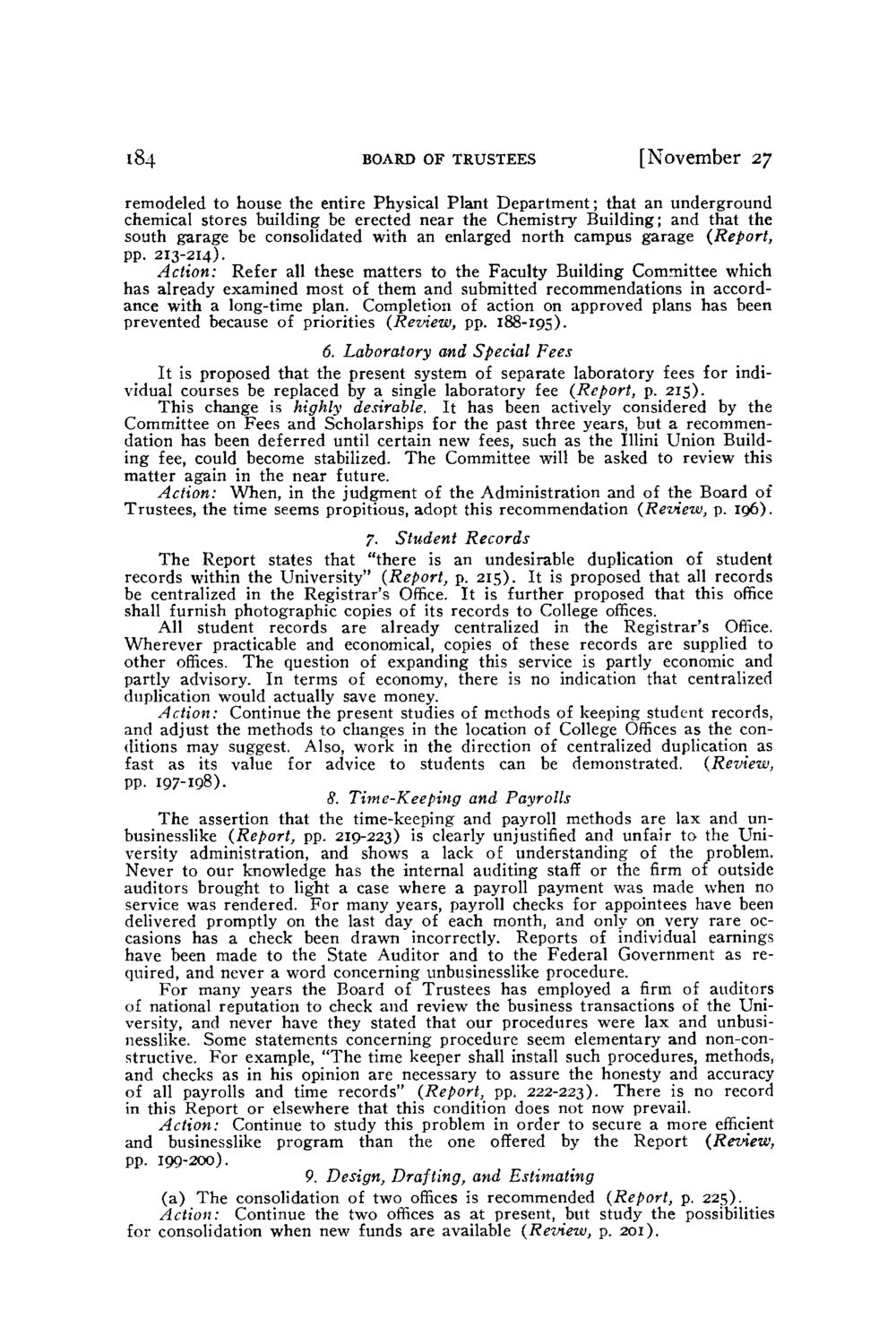| |
| |
Caption: Board of Trustees Minutes - 1944
This is a reduced-resolution page image for fast online browsing.

EXTRACTED TEXT FROM PAGE:
184 BOARD OF TRUSTEES [November 27 remodeled to house the entire Physical Plant Department; that an underground chemical stores building be erected near the Chemistry Building; and that the south garage be consolidated with an enlarged north campus garage {Report, pp. 213-214). Action: Refer all these matters to the Faculty Building Committee which has already examined most of them and submitted recommendations in accordance with a long-time plan. Completion of action on approved plans has been prevented because of priorities (Review, pp. 188-195). 6. Laboratory and Special Fees It is proposed that the present system of separate laboratory fees for individual courses be replaced by a single laboratory fee (Report, p. 215). This change is highly desirable. It has been actively considered by the Committee on Fees and Scholarships for the past three years, but a recommendation has been deferred until certain new fees, such as the Mini Union Building fee, could become stabilized. T h e Committee will be asked to review this matter again in the near future. Action: When, in the judgment of the Administration and of the Board of Trustees, the time seems propitious, adopt this recommendation (Review, p. 196). 7. Student Records T h e Report states that "there is an undesirable duplication of student records within the University" (Report, p. 215). It is proposed that all records be centralized in the Registrar's Office. It is further proposed that this office shall furnish photographic copies of its records to College offices. All student records are already centralized in the Registrar's Office. Wherever practicable and economical, copies of these records are supplied to other offices. T h e question of expanding this service is partly economic and partly advisory. In terms of economy, there is no indication that centralized duplication would actually save money. Action: Continue the present studies of methods of keeping student records, and adjust the methods to changes in the location of College Offices as the conditions may suggest. Also, work in the direction of centralized duplication as fast as its value for advice to students can be demonstrated. (Review, pp. 197-198). S. Time-Keeping and Payrolls T h e assertion that the time-keeping and payroll methods are lax and unbusinesslike (Report, pp. 219-223) is clearly unjustified and unfair to the University administration, and shows a lack of understanding of the problem. Never to our knowledge has the internal auditing staff or the firm of outside auditors brought to light a case where a payroll payment was made when no service was rendered. For many years, payroll checks for appointees have been delivered promptly on the last day of each month, and only on very rare occasions has a check been drawn incorrectly. Reports of individual earnings have been made to the State Auditor and to the Federal Government as required, and never a word concerning unbusinesslike procedure. For many years the Board of Trustees has employed a firm of auditors of national reputation to check and review the business transactions of the University, and never have they stated that our procedures were lax and unbusinesslike. Some statements concerning procedure seem elementary and non-constructive. For example, " T h e time keeper shall install such procedures, methods, and checks as in his opinion are necessary to assure the honesty and accuracy of all payrolls and time records" (Report, pp. 222-223). There is no record in this Report or elsewhere that this condition does not now prevail. Action: Continue to study this problem in order to secure a more efficient and businesslike program than the one offered by the Report (Review, pp. 199-200). 9. Design, Drafting, and Estimating ( a ) T h e consolidation of two offices is recommended (Report, p. 225). Action: Continue the two offices as at present, but study the possibilities for consolidation when new funds are available (Review, p. 201).
| |